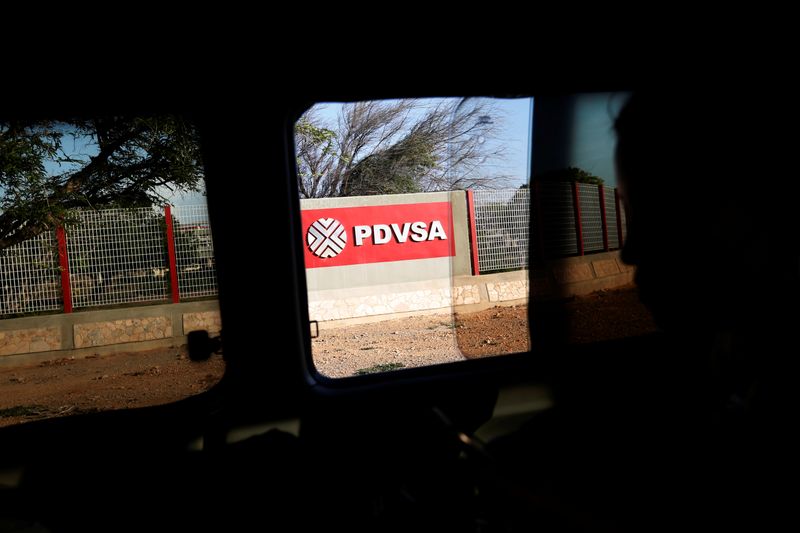By Marianna Parraga
(Reuters) - Venezuelan state-run oil firm PDVSA has begun offering to ship its own oil, figuring in the costs in crude supply deals to help customers who have struggled to hire vessels to carry the country's oil due to U.S. sanctions, according to company documents seen by Reuters.
The United States has blacklisted vessel owners, shipping operators and threatened to sanction any tanker facilitating the country's oil exports as it tightens restrictions on trade with the South American country.
Washington has been trying to weaken socialist President Nicolas Maduro by choking the OPEC member's oil exports, depriving the government of petrodollars -- its main source of revenue.
Most shipping firms are avoiding Venezuela because of the sanctions, making it difficult and expensive to hire tankers to load crude there and helping drop the country's oil exports to their lowest in nearly 80 years.
PDVSA has agreed since at least April with both long-term and new customers to oil deals that make the state firm responsible for transportation costs, and sometimes customs fees, according to internal documents from the state company seen by Reuters.
In previous deals, buyers sent ships to Venezuelan ports to load the crude.
"We are starting to use our own fleet and controlled fleet," a PDVSA executive told Reuters.
Under the new deals, buyers designate the port for delivery and PDVSA is responsible for getting the oil there, according to the documents.
The strategy, also used by other countries under U.S. sanctions such as Iran, could be short-lived if PDVSA is unable to gather enough vessels.
Of the more than two dozen vessels PDVSA controls, only four have valid classification and insurance, according to company and shipping sources.
Aside from some short trips to Cuba, most of PDVSA's tanker fleet has stayed in Venezuelan waters for the last year because sanctions have left them lacking the insurance or certification needed to navigate international waters, or because they are unseaworthy.
Some vessels no longer have operators because PDVSA failed to pay the firms that managed the vessels and crews.
Germany's Bernhard Schulte Shipmanagement returned over a dozen vessels to PDVSA in 2019 after the Venezuelan firm failed to pay fees due for managing them.
Other ships need maintenance. PDVSA has struggled to get the work done because it cannot get needed parts or afford to pay for the work. The company has also faced lawsuits and seizure attempts by foreign shipyards that did repairs.
Since last year, PDVSA has kept vessels close to home to avoid the danger that they or their cargoes may be retained by foreign creditors.
PDVSA owns four China-built very large crude carriers (VLCCs) along with PetroChina that can transport up to 2 million barrels of oil each. That fleet, controlled by the joint entity CV Shipping, could be lost though, if Singapore's high court rules the tankers can be seized or auctioned to pay creditors.
PDVSA also has started to use tankers for international voyages that were initially leased for shipping oil within its waters.
UNDERWAY
In July, PDVSA sent a letter to one of its long-term customers, Thailand's Tipco Asphalt, proposing to use its vessels to export crude with freight costs included, according to the documents.
Tipco and PDVSA agreed to a preliminary schedule for a cargo to sail in August, according to the documents and sources.
PDVSA made the proposal to Tipco after the Thai firm, which needs Venezuelan oil for its refinery in Malaysia, struggled to find ships willing to load in Venezuela. Vessel owners canceled Tipco contracts for voyages from Venezuela in June and July.
Tipco has asked permission from the U.S. Treasury to continue receiving Venezuelan oil under a long-term supply contract signed before sanctions were imposed, according to the sources.
PDVSA, Tipco and the U.S. Treasury Department did not reply to requests for comment.
Even under the new arrangements, PDVSA is struggling to deliver its oil. The first cargo to sail under the new deals was on the Panama-flagged tanker MT Kelly, which left Venezuela for Turkey carrying 1.96-million barrels of heavy crude in April, according to the PDVSA documents.
The vessel u-turned near Turkey, sailed back out of the Strait of Gibraltar to skirt around Africa en route to the Middle East. Its satellite transponder has been off since June 22, Refinitiv Eikon vessel data showed, so it is unclear whether it has delivered the cargo.
Sanctions have left some 20 million barrels of Venezuelan crude stranded at sea, as PDVSA struggles to find buyers.

"This is a really toxic moment for doing business with Venezuela," said a diplomatic official involved in sanction-related talks.